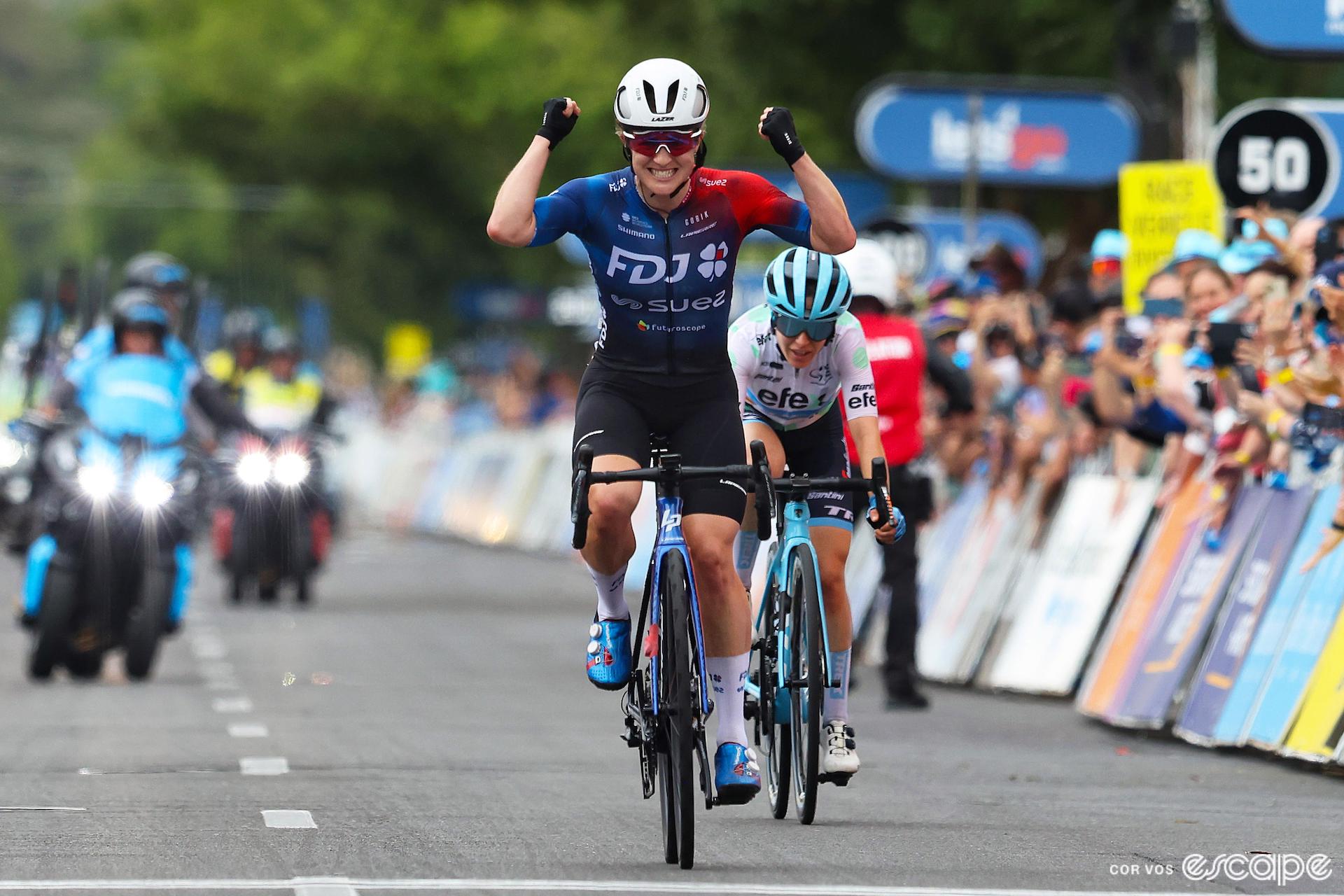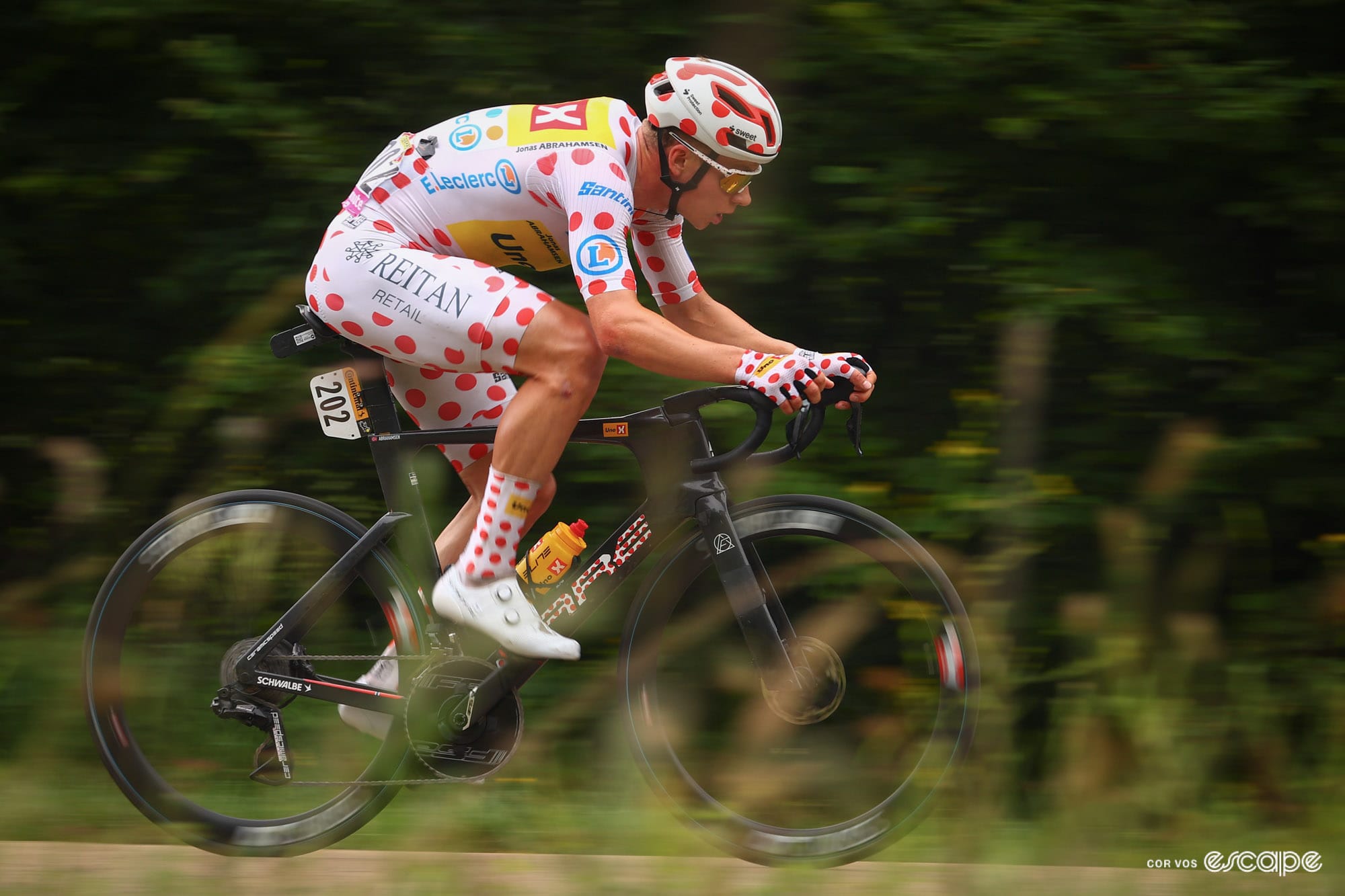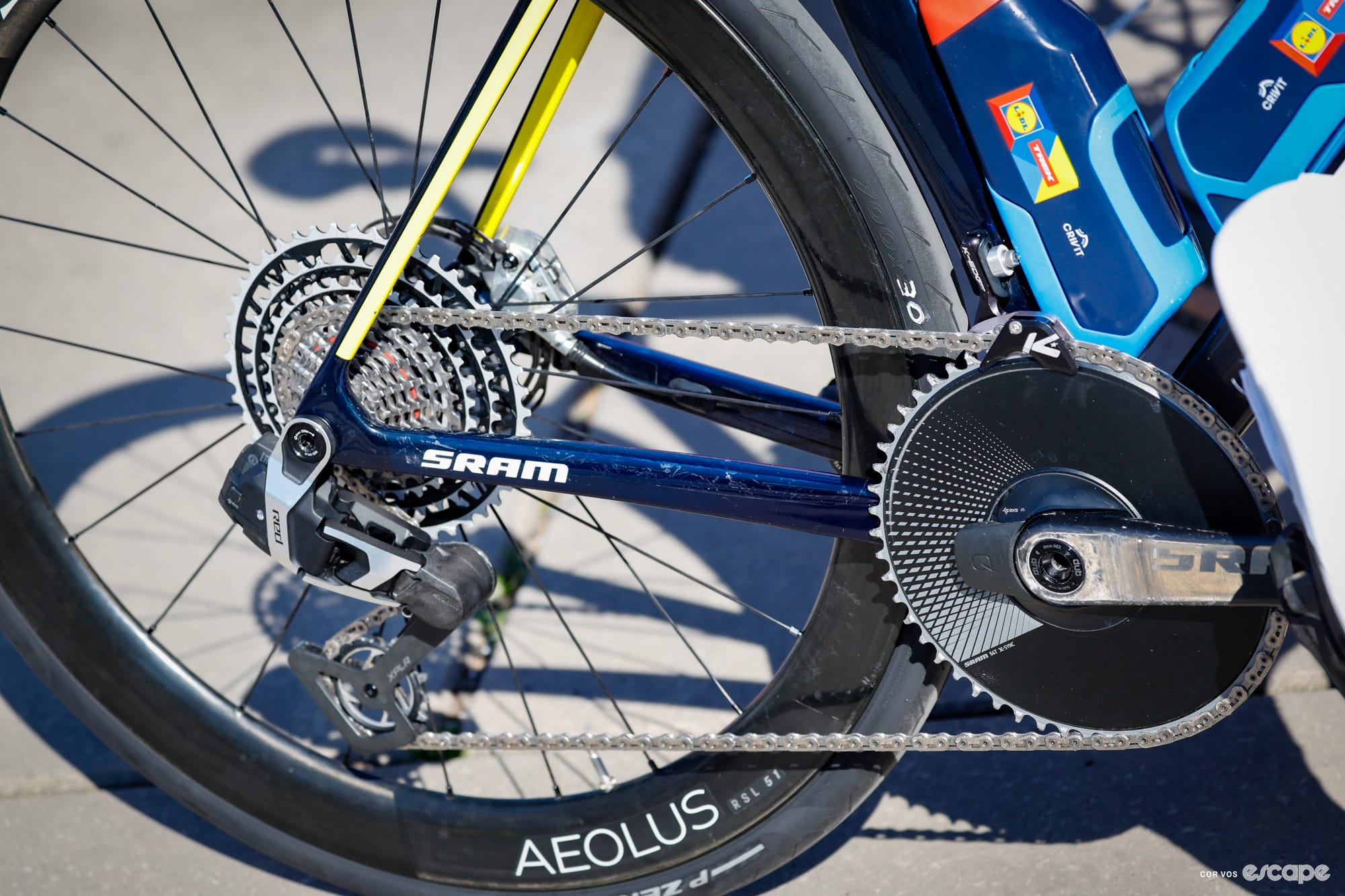It’s been a season of mixed fortunes for Grace Brown (FDJ-Suez). The 30-year-old started 2023 in great form, winning her second-straight Australian time trial title, and then went on to win the Santos Tour Down Under for the first time.
After landing in Europe, she didn’t quite have the Spring Classics period she was hoping for, but since then she’s taken a handful of wins in France: a solo victory at the GP du Morbihan, followed by a stage win and overall success at the Bretagne Ladies Tour.
Earlier this week Brown spoke to Escape Collective from the streets of Bilbao, Spain, the day after finishing the Vuelta a Burgos. She spoke candidly about the frustrations of that race, the ups and downs of her season in general, what it’s like racing in an SD Worx-dominated peloton at the moment, and what the rest of the season holds for her.
***
Matt de Neef: You mentioned to me earlier that it was a pretty ordinary week for you and the team at the Vuelta a Burgos. Do you want to talk a bit about that? I’m guessing you were hoping for more?
Grace Brown: Yeah, I mean, it's not like the tour was a really big target, but every time we race we want to do our best so I guess it was a bit disappointing. We had a pretty bad day on stage 2 in the crosswinds. You can't really say it's bad luck because everyone knew that it was gonna go down like it [did]. It was just a matter of making it to the front of the echelon and we weren't able to do it.
Was it an issue of positioning? Or was it something else?
So literally, it was crosswinds from kilometre zero. So as soon as the flag dropped at the end of neutral, we were sprinting from behind the neutral car.
You have to be strong, obviously, to get to the front – you had to do a massive effort. Personally, I managed to get into the top five wheels and I went round into the protected side of the echelon and then another group came up on the wind side, and you just get pushed back. And then I had to try and do another massive effort to get back there. In that moment, someone dropped the wheel and the split happened, and then it was just over.
The reason SD Worx were there and Trek[-Segafredo] is that they just have a lot of confidence in the fact that they can do it. And potentially we [FDJ-Suez] needed to be a bit more united in our effort as a team to use our strengths together to be there. So yeah, it's something that we really need to work on, because we've had now, this season, a fair bit of bad luck in echelon situations.
That was pretty early in the stage that it split, right?
Yeah, it was after five k’s.
What was the rest of the stage like when you're seeing the front of the race ride away?
Well, you're just trying to recover the situation. So immediately in the second group we came together and were pushing to try and close the gap but our group was a little bit bigger and lots of different teams were in there. It was really difficult to coordinate the chase because there were some riders from teams that had teammates in the front so they got into the roll and then they slowed down at the front. And then there's people that are just there trying to survive.
So, as a team, it was difficult for us to control the chase. But yeah, it was literally 120 km just working as hard as we could. At one moment that gap came down to, I think, 19 seconds. But then went out again.
There's been a lot of talk about SD Worx’s dominance this season. I wonder if you can give your perspective of what it's like inside the peloton when a team is so dominant like that. Do you guys talk about that in your team meetings? Do you just ignore it? How do you approach it?
Yeah, it's pretty hard to ignore because it's almost impossible to beat them at the moment. They have Demi [Vollering] for the climbs, they have Lorena [Wiebes] for any sprint stage, they have [Lotte] Kopecky and [Marlen] Reusser for anything in between *laughs*.
At the start of this year we were still saying 'Forget about SD Worx, we're gonna ride our own race.' I think it was the same for a lot of teams just trying to focus on our own performance rather than just racing against SD Worx. But honestly now I think it's getting a little bit disheartening.
For instance, the second-last stage here in Burgos there was a breakaway with mainly small teams in it – we weren't there, Trek wasn't there, Canyon[-SRAM] wasn't there. But none of us were chasing because, well, number one we wanted to leave it up to SD Worx to have to chase but also, we would just be happy for any other team to win!
But I think, now, we need to have a bit of a reset, particularly for the Tour de France, which is really the next big target. We need to go in with some different tactics, I think, to make sure that it's not an SD Worx show.
Is there any sense of teams working together to fight SD Worx? Can you work with Trek or Movistar and say ‘Come on, this benefits all of us to work together!’?
There is a little bit of that. Yeah, there's certain teams in the peloton that have friendships, I guess. FDJ and Movistar are a bit close so sometimes we'll talk and, you know, 'we want to make the race aggressive' or something – try and join forces a little bit to work against the strength of SD Worx. But at the end of the day, we're still racing against those teams. So there's a small allegiance there, but it's not the same as them also being our teammates.
Just to go back a bit, I'd love to hear your thoughts on the Aussie summer. You obviously had a great run there with Nationals and then winning TDU. I wonder if you can reflect a little bit on how you saw that period and how you were feeling coming over to Europe for the Spring Classics?
Yeah, the summer was a really awesome start. Especially doing Tour Down Under with my team and having the success there and riding really well together, I felt pretty positive about the Classics, that it was going to continue to be good. In Australia I wasn't really in my peak form but we managed to get results at that level. So I was hoping that we were continuing to build from there, I guess. But yeah, winning Tour Down Under was awesome. That was such a great atmosphere and lots of fun.
And how do you look back on the Spring Classics experience? I think from the outside the impression would be that you didn't do as much as you would have liked. Is that fair to say?
Yeah. My targets were Flanders and Roubaix for the Spring Classics. I was really disappointed with Flanders. Just the way the race played out, I didn't even get to fight at all. So that put a bit of a dampener on it.
And then Paris-Roubaix was a good race – I had my teammate [Eugénie Duval] in the breakaway. In the end, because it was such a big group coming to the finish line, that gap could have come down but personally, I was doing what I could to [make sure the break didn’t get caught]. At a certain point we were closing it down and then we came to the last cobbled sector and I was like, 'I gotta put the brakes on here because my teammate has a fair bit bigger chance of winning this race than I do’, if we were two in a group of 20 at the finish versus one in a group of six.
So yeah, I didn't get the result I was after but my teammate had a really good ride there [Duval finished fourth, the biggest result of her career – ed.]. So it was still a fun race. But yeah I didn't come away from the spring with any result to really write home about.
Was your frustration with Flanders mostly about the Koppenberg? Because I know you posted about that on social media, and about the frustration of how that affected the race. Was there more to it than that?
No, it was just the Koppenberg really. I get that you have to be in position there and be at the front to have the best chance of making it up there with the front group, but really, when the whole peloton is walking up the Koppenberg it's not a bike race anymore. To have an obstacle like that in the race – if we're gonna have the same thing next year, I'm not really that excited about Flanders anymore. And the fans don't get to see the best race because it's over before it starts.
So yeah, I don't know. Maybe it's an unpopular opinion. But that's how I feel about it.
Tell me about these couple of French races that you won. I assume these are races that are important to your FDJ-Suez team, being a French squad?
Yeah, I think any race in France is important and maybe our team is even obliged to do all the French Cups, I think, by the French federation. But yeah, it can also be nice to do some of these smaller races as well, with a little bit less pressure. Even though it's important for the team, the pressure is not the same.
For the one-day race that I won, it was quite an open strategy for us. I wasn't necessarily the leader there but I think sometimes that's good for me because I just do what I want. And I saw this moment to attack really early and just went for it. Whereas when you're actually the leader, to attack and go solo with 48 km to go is a bit risky. But it didn't really matter if I got caught and then lost the race, in my mind, so I was willing to risk it and go for it.
So it was fun for me to have that opportunity to race a bit like that again, because it's sort of how I started, in that style and the longer I've been in the pro peloton, the less I've been able to do that.
Is that just a result of team tactics and having a more defined role, rather than just being able to read the race?
Yeah, a bit of that. Also, I guess, when you become known for getting away or being able to ride away in scenarios like that, then the peloton doesn't really let you; they're onto it. So it's become harder to do a breakaway. But also, yeah, if you're the team leader in a race, then the tactic is usually to race the final, so you wait until the hardest parts of the race. Whereas this was just sort of a bit random.
What was it about that moment at 48 km to go that made you think 'this is it'?
Well, Cofidis were on the front and they were really setting a hard pace up the climb and I positioned myself behind their best climber thinking that she was going to attack, and then she didn't. And I was like 'Well, if you're not going to attack, I'll attack.' *laughs* I just felt the moment and I went for it. And then I was solo and I was like 'Oh no, it's a long way to the finish line from here' *laughs*.
But you're committed by that point, right?
Yeah, exactly. Once you've put the effort in, there's no sitting up.
And then the Bretagne Ladies Tour – I think the time trial there was your first this year in the Aussie national champ's colours?
Yeah. Last year, I didn't get to do any time trials in my national champ's suit. I just did the Nationals and I did the World Championships [where Brown finished second - ed.] and that was all. But this year, there's a lot more opportunities. So this was my first in the national champ's suit, and then also the Tour de France will be my next opportunity.
The main reason I did this race was for the time trial and that was the goal, and then the GC [win] was a bonus. Because on the first stage I lost a lot of time, like 52 seconds or something, so I thought even with a good time trial I wasn't gonna get into the GC lead. But then I did a better time trial than I expected so I found myself leading the tour as well. That was cool. [Brown won the stage by 1:09 to jump from 11th overall to first - ed.]
I bet that was satisfying to get a few results in France after the Classics didn't go the way you wanted?
Yeah, it was really nice to get those results. It's not the same excitement as winning one of those really big races, but it's still satisfying, yeah.
I wonder if I can get your thoughts quickly on the evolution of the WorldTour calendar? From the outside it looks like things are getting really crowded with lots of races packed in together and a lot of travel. Has that been your impression too?
Yeah, I think teams are struggling, really, especially this block now with all the Spanish races. Our team had to do these French races at the same time and we honestly just didn't have enough riders. Because we've got some girls with injuries, some that are a bit sick at the moment and can't race, so it's a real struggle. I think there's some riders that did every race in Spain, not on our team, but on some other teams, and they are smashed.
I'm not sure about bringing the Vuelta [to May] – I don't really understand why it needed to be moved. Because after this month, especially since the women's Tour of Britain was cancelled, we've got June and July without much racing. If you don't do the big tours [the Giro Donne and the Tour de France Femmes avec Zwift - ed.], then you've got hardly anything on your calendar. And then the season sort of tails off in just like an odd assortment of races in October. So it feels like everything's pushed into the start of the season and then it's lost its structure a bit.
So what’s next for you? You mentioned the Tour de France Femmes?
I'm doing the Tour of the Pyrenees which is June 9-11. And before that I'm going to go and look at the courses in Scotland for the World Championships. And then I'll have a bit of a mental break coming back to Australia for a few weeks before the Tour. So I have a bit of a quieter period now, which I think will be good after a bit of a hard spring, I guess, just to mentally refresh, and come back with good motivation for the Tour.
Judging by your Instagram posts, you seem like somebody that gets a lot out of that downtime away from racing, particularly spending time with family and friends to recuperate.
Yeah. My home is still Australia and my support network is still there. That's where I get my energy from so when I'm over here [in Europe] for a long period of time, yeah, I start to feel the toll. Last year I did the same thing – I came back to Australia and it was really nice re-joining the team and having good energy for the second part of the season. So we know that works and the team is really onboard.
Does your husband live back here in Australia, or does he live with you over in Italy?
No, he's in Australia. He makes trips over but he's got his own business in Melbourne so he can't leave.
I’m guessing that means you won’t do any altitude training before the Tour? I feel like altitude training is becoming a lot more popular in the women's peloton in the last year or so. Is that fair to say?
Yeah, it's true. A lot more people are doing it. I think, with the extra money now that's around – salaries have increased – riders have the means to afford altitude camps. So yeah, basically all the top riders are doing it. Even riders that aren't top riders are doing it. The level of the peloton is just getting higher and higher.
For me, it's a bit of a balance thing where I have to decide either I come back to Australia, or I go to altitude. What's more important? It's a bit tricky. I think maybe I miss some of the benefits of training at altitude but I've decided to come back to Australia. But I've done altitude in the past and my feeling is that I get similar benefit from a really hard training block, whether I'm at altitude or not. So I'm telling myself that anyway.
Did we do a good job with this story?






